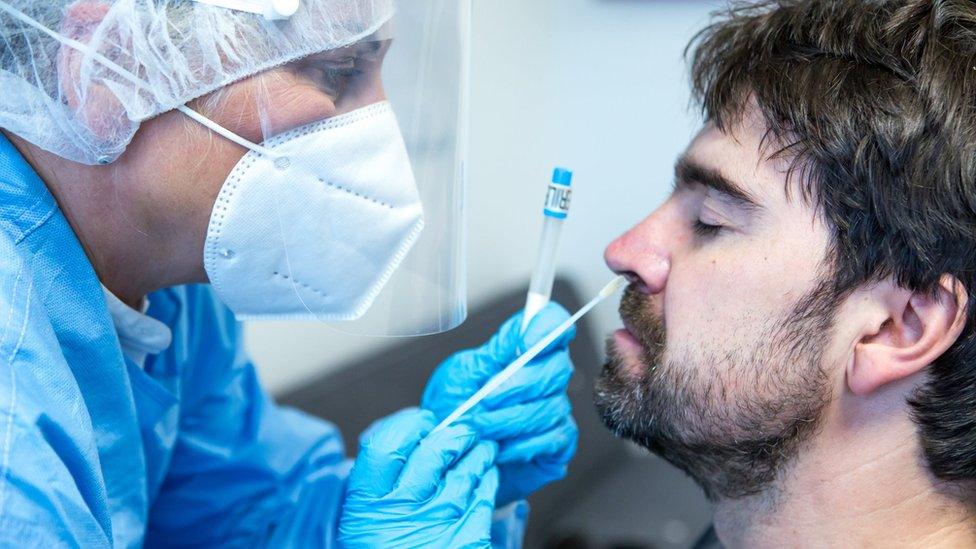Deliberate infections give unique Covid insight
- Published

The world's first Covid "challenge trial" - which deliberately infected people - gives a unique view on the early stages of the disease.
The virus was given to 36 young, healthy and unvaccinated volunteers, at the Royal Free hospital, in London.
The results show where and when the virus takes hold in the body - and that some resist the infection.
Future challenge trials could help find the next generation of Covid vaccines and drugs.
They allow scientists to study the earliest stages of an infection, even before symptoms develop.
First symptoms
Each of the volunteers, aged 18-30, had an identical dose of Covid - equivalent to the amount in a single droplet propelled out of somebody's nose during the peak of their Covid infection - squirted up their nose.
But only half of them became infected.
And understanding how the others - unvaccinated and without immunity from previous infections - resisted the virus will be the focus of future research.
In those that did develop an infection, the virus took off rapidly, the first symptoms and positive test results appearing within just 42 hours.
The previous consensus had been it took five days from exposure to the virus to first symptoms.
And while the virus takes a foothold in the throat, the greatest amount was found when it moved up to the nose, leading the researchers to stress the importance of facemasks covering both.
'Major impact'
"It's a really unique study," Prof Christopher Chiu, from the Institute of Infection, at Imperial College London, said.
The amount of virus peaked about five days after the infection and remained detectable up to 12 days later.
Symptoms were mild but some volunteers had a prolonged loss of their sense of smell.
Prof Chiu said: "Lateral flow tests correlate very well with the presence of infectious virus.
"Even though in the first day or two they may be less sensitive, if you use them correctly and repeatedly, and act on them if they read positive, this will have a major impact on interrupting viral spread."
'Key data'
The virus used was an early variant taken from a patient at the start of the pandemic.
Further studies will explore more recent versions.
The main finding - that it was safe to perform challenge trials - opens up new avenues of research.
Challenge trials have yielded advances in medicine such as the new Typhoid vaccine and it is hoped the same approach could lead to a new generation of Covid vaccines and antivirals.
The findings have been published online, external but not formally reviewed by other scientists.
Deputy chief medical officer for England Prof Sir Jonathan Van-Tam said: "This important study has provided further key data on Covid-19 and how it spreads, which is invaluable in learning more about this novel virus, so we can fine-tune our response."
Follow James on Twitter, external.